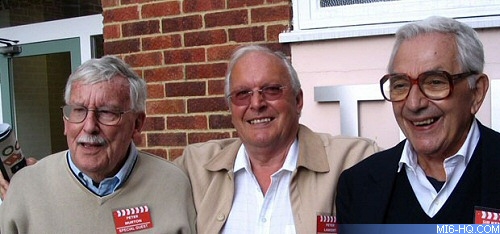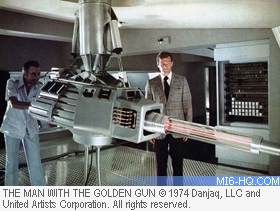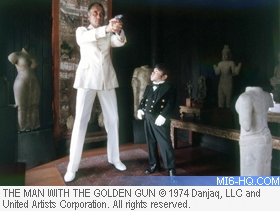 |
| |
Peter Murton, acclaimed production designer and
veteran of three James Bond films, has died...
|
|
Peter Murton Biography
7th February 2010
Acclaimed Art Director and Production Designer
Peter Murton has died. He passed away shortly before Christmas
2009. Murton's
career
spanned over 50 years and included some of the biggest and most
popular British-produced films of the era, including three James
Bond movies.

Above: Peter Murton (left) with
Peter Lamont (centre) and Sir Ken Adam (right) at
the
" Behind
The Scenes Of Bond" event in July 2007.
|
His first credit came on the Arthur Crabtree
helmed "Madonna of the Seven Moons" in 1945, when he
began his career as a draughtsman for Gainsborough Pictures.
After completing work on "Caravan" (1946) for the company,
he continued in his role draughtsman for several different production
companies until 1957, where he moved on to become a set dresser
for Rank on "Across the Bridge". After several films
as a set dresser, Murton had his first Assistant Art Director
credit on "Tarzan's Greatest Adventure" in 1959, followed
by "Swiss Family Robinson" in 1960.
Murton directed his first art department on
the Peter Sellers film "Mr. Topaze" in 1961, and worked
again with him on "Dr. Strangelove or: How I Learned to
Stop Worrying and Love the Bomb" in 1964.
Sean
Connery would first
meet Murton on "Woman of
Straw" in 1964 when he once again filled the position
of Art Director. He would continue this role on two of
Connery's outings as James Bond - "Goldfinger" in
1964 and "Thunderball" in 1965. Both times he
worked with long-term 007 Production Designer Ken Adam.
Impressed with his duties on Bond, producer Harry Saltzman
hired him on his Harry Palmer movies "The Ipcress
File" (1965) and "Funeral In Berlin" (1966),
where he was also reunited with director Guy Hamilton.
Murton made the transition to Production Designer on "The
Ruling Class" (1972) for Hungarian director Peter
Medak.
007 would come calling again in 1974,
when Murton was promoted to Production Designer on Roger
Moore's second
Bond movie "The
Man With The Golden Gun". One of the many sets
he designed was the iconic 'funhouse' where Scaramanga hunts
his opponents and faces off against 007 in the climactic
confrontation.
Working under him as co-art director
was Peter Lamont, who would become a regular fixture
as production designer on all but one of the Bond movies
from "For Your Eyes
Only" (1981) until "Casino
Royale" (2006). |
|


Above: Two of the impressive sets designed
by Peter Murton for "The Man With The Golden Gun" (1974).
|
He continued in the role of Production Designer
for a total of 18 films, including some of the biggest movies
produced in
Britain at the time, including "The Eagle Has Landed" (1976), "Dracula" (1979),
and both the "Superman" sequels in 1980 and 1983.
|
Above: Moore
(Bond) and Lee (Scaramanga) in the Funhouse
designed by Murton.
|
After his last big screen production as Art
Director on "Stargate" in 1994, Murton returned to
the world of James Bond in 2005 when MI6, Cinema Retro and BondStars
hosted the 40th
anniversary "Thunderball" gala event in London in November 2005. "This was my first time at a
Bond tribute event, so I didn't know what to expect really",
he said at the end of the evening. "Boy, this was like being
at a premiere of a movie, and to see such a stunning widescreen
print, after all those years, was a real treat."
Murton
would go on to make special guest appearances at further BondStars
events, including the "Goldfinger" reunion in April
2008 and "Behind The Scenes Of Bond" in July 2007,
where he was united with fellow Bond production designers Sir
Ken Adam and Peter Lamont. It was the first time that all three
had been together at an event. Between the trio, they lead the
art departments or production design teams on all the Bond films
from "Dr. No" to "Casino
Royale".
|
(Above left): Peter
Murton & Martine Beswicke, (Above right): Peter Murton,
Martine Beswicke, Molly Peters, Earl Cameron and George
Leech at the "Thunderball" 40th Anniversary
event.
|
Related Articles
 Goldfinger
Goldfinger
 Thunderball
Thunderball
 The
Man With The Golden Gun
The
Man With The Golden Gun
Photographs © 2007 Matthew Field and © 2005 Tom
Stroud.